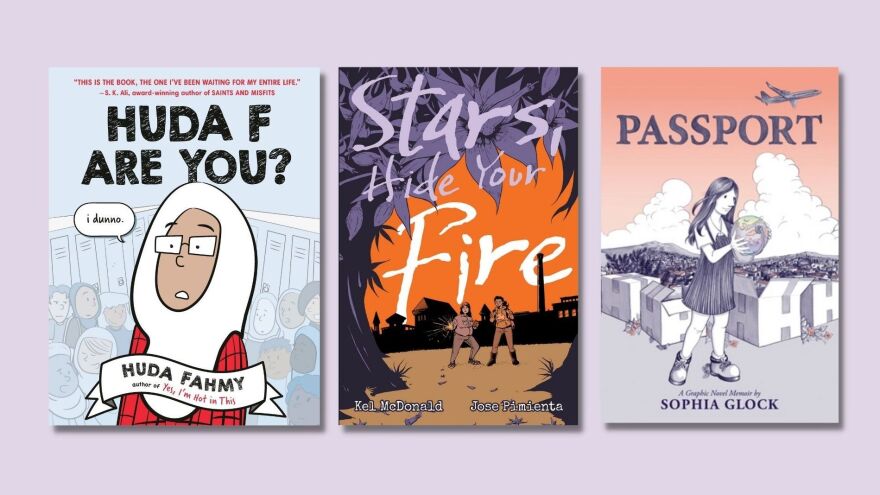It's evident that 2021 has been a bumper year for graphic novels aimed at the high-school set. Among the flood of titles competing for youthful eyeballs, though, a few stand apart this fall for their unorthodox stories, deft artwork and potent themes.
Though their settings range — from a post-industrial Massachusetts town to a series of deliberately unnamed cities in Central America — Sophia Glock's Passport, Huda Fahmy's Huda F Are You? and Kel McDonald and Jose Pimienta's Stars, Hide Your Fire express similar cares and concerns. Their protagonists' adventures may be wildly diverse, but they illustrate the broad relevance of teen experience – whatever your age.
Passport by Sophia Glock
Most Young Adult books grapple with the familiar dilemmas of teenage-hood: making friends and losing them, figuring out what's cool this week, managing to exchange a few words with your crush without totally embarrassing yourself. For Sophia Glock, these coming-of-age milestones were mixed with a number of decidedly uncommon happenings. There were her father's mysterious trips away from home at night, which he explained as going "to see a man about a horse." There were the family's abrupt, secretive moves, often from one country to another. There was the letter Sophia's sister wrote to her parents from college, which Sophia read when her mother wasn't looking. "I'm not sure how I messed up so bad," Sophia's sister writes in Passport. "But this guy at school kept pestering me about your jobs, and I got so frustrated I just told. I feel terrible about telling the secret."
In this graphical memoir, Glock reveals to the world what "the secret" was: Her parents were spies for the CIA. Glock's story of growing up in the shadow of her parents' espionage seems almost too remarkable to be believed, even interspersed with the normal travails of a teen girl. Her simple, unassuming drawings heighten the sense of disconnection. Most teenagers infuse their lives with an outsized sense of drama. Glock struggled to achieve normalcy in a world whose dangers were all too real.
Stars, Hide Your Fire by Kel McDonald and Jose Pimienta
McDonald's tale blends elements of realism and fantasy into a distinctly modern take on the supernatural. In Andrea and Darra's town, the departure of cornerstone industries has left behind skeletons of once-busy factories. There's not much else to inspire the teens' imaginations, so they explore the hulking wrecks and dream of getting out. When Andrea meets a real spirit, the girls must draw on their ingenuity and their deepest values to avoid being tricked into a fatal bargain.
Pimienta's moody artwork infuses McDonald's story with vitality. The book's full-color pages are drenched in lush yet downbeat purples, pinks and blues. It's the palette of teenage dreams, simultaneously romantic and melancholy. Also romantic and melancholy is Andrea's mysterious new friend Carmen, who echoes Andrea's fears and frustrations with uncanny accuracy. When Carmen tells Andrea, "There's nothing worse than being trapped in a dull, lifeless place," Andrea agrees instantly. McDonald's story is a reminder of just how tempting, terrifying, and even otherworldly the future can seem when you're in high school.
Huda F Are You? by Huda Fahmy
The offbeat charisma that makes Huda Fahmy irresistible is evident in the title of her first book aimed at teens. Huda F Are You? is a fitting addition to a body of work that includes Yes, I'm Hot in This: The Hilarious Truth About Life in a Hijab and That Can Be Arranged: A Muslim Love Story. Like its predecessors, Huda F explores the quirks of American Muslim life with an unerring eye for humorous detail and an occasional dose of exasperation. Here, though, her focus isn't on what makes Muslims different — or seemingly different — from non-Muslims, but on the struggle for self-definition that all teen girls face.
When her parents decide to move to a city with "more community," protagonist Huda F. (whom Fahmy explains is a loosely fictionalized version of her teenage self) finds herself going to school with other Muslims for the first time. "At least in middle school I wasn't invisible," Huda frets. "I was The Hijabi. It was all I had that set me apart, and I let it become my whole personality. Now I'm not the Muslim, I'm just a Muslim, and there are hijabis everywhere." Fahmy's winsome artwork is the perfect accompaniment to her wry reflections. Paring down her drawings to a few key lines, she still makes the most of every opportunity for visual witticisms. Teen readers — and any adult who makes time for this charming read — will instantly relate to Huda's quest to find herself.
Etelka Lehoczky has written about books for The Atlantic, The Los Angeles Review of Books and The New York Times. She tweets at @EtelkaL.
Copyright 2021 NPR. To see more, visit https://www.npr.org.


